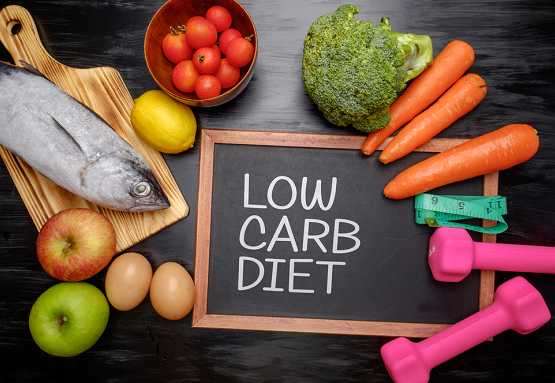
‘Low-carbohydrate diets’ are one of the most searched topics on the Internet today. A popular variant of the low carbohydrate diet is the ‘ketogenic diet’ which prioritises high fat intake for weight loss. With all the hype surrounding it, does cutting down our rice and overall carbohydrate intake truly benefit our health?
What is a Low-Carb Diet?
Carbohydrates are a macronutrient found in many foods and drinks – and are important as our body’s main fuel source.
Carbohydrate recommendations from various countries range from 45-65% of our daily calories. A low-carbohydrate (low-carb) diet emphasises foods high in protein and fat, limits (or even excludes) most rice, noodles, bread, pasta, legumes, fruits, sweets, starchy vegetables and dairy products. This diet reduces carbs to below 45% of our daily calories.
Some examples of low-carb diets are the ketogenic, low-carb high-fat (LCHF), the Paleo and the Atkins diets. Each has different restrictions on the types and amounts of carbohydrates you can eat.
Are There Benefits of Following a Low-Carb Diet?
Yes, health benefits have been demonstrated – such as weight loss and lowered risk of chronic diseases including diabetes and cardiovascular disease.
There are several theories for what causes weight loss:
However, few long-term studies have been conducted on low-carb diets. As such, the health benefits of sticking to such a diet beyond one year have yet to be determined.
REFERENCES
Campos, M. (2018). Ketogenic diet: Is the ultimate low-carb diet good for you? Harvard Health Publishing. Harvard University. Retrieved from < https://www.health.harvard.edu/blog/ketogenic-diet-is-the-ultimate-low-carb-diet-good-for-you-2017072712089> Accessed 17 July 2019.
Harvard Health Publishing (2018). The smart way to look at carbohydrates. Harvard Men’s Health Watch. Harvard University. Retrieved from < https://www.health.harvard.edu/staying-healthy/the-smart-way-to-look-at-carbohydrates> Accessed 15 July 2019.
Harvard School of Public Health (n.d.) Diet Review: Ketogenic Diet for Weight Loss. Harvard University. Retrieved from < https://www.hsph.harvard.edu/nutritionsource/healthy-weight/diet-reviews/ketogenic-diet/> Accessed 19 July 2019.
Health Promotion Board (2010). Report of the National Nutrition Survey 2010. Research & Strategic Planning Division. Health Promotion board. Retrieved from < https://www.hpb.gov.sg/docs/default-source/pdf/nns-2010-report.pdf?sfvrsn=18e3f172_2> Accessed 17 July 2019.
Klemm, S (2018). Back to Basics for Healthy Weight Loss. Eat Right. Academy of Nutrition and Dietetics. Retrieved from < https://www.eatright.org/health/weight-loss/your-health-and-your-weight/back-to-basics-for-healthy-weight-loss> Accessed 19 July 2019.
Mayo Clinic (2017). Low-carb diet: Can it help you lose weight? Mayo Foundation for Medical Education and Research (MFMER). Retrieved from < https://www.mayoclinic.org/healthy-lifestyle/weight-loss/in-depth/low-carb-diet/art-20045831> Accessed 14 July 2019.
Oh R. & Uppaluri K.R. (2019). Low Carbohydrate Diet. [Updated 2019 May 13]. StatPearls [Internet]. Treasure Island (FL): StatPearls Publishing; 2019 Jan-. Retrieved from < https://www.ncbi.nlm.nih.gov/books/NBK537084> Accessed 14 July 2019.
Paoli A., Rubini A., Volek J.S. & Grimaldi K.A. (2013). Beyond weight loss: a review of the therapeutic uses of very-low-carbohydrate (ketogenic) diets. European Journal of Clinical Nutrition Volume 67, Pages 789–796 (2013). Retrieved from < https://www.nature.com/articles/ejcn2013116> Accessed 13 July 2019.
World Health Organization (2015). Q&A on the carcinogenicity of the consumption of red meat and processed meat. Retrieved from < https://www.hsph.harvard.edu/nutritionsource/healthy-weight/diet-reviews/ketogenic-diet/> Accessed 19 July 2019.
This article is contributed by our dietitians from the Nutrition and Dietitian department of Mount Alvernia Hospital.
To read on Part 2 of the article – click here
To learn more about our Nutrition and Dietitian services, click here